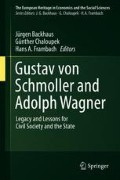Abstract
Adolph Wagner (1835–1917) did break new grounds in economics by conceiving redistribution of wealth and income as a provision in the collective need for less economic inequality. In his organic conception of society the government has an identity of its own and makes decisions in the general interest. The two Swedes Wicksell (1896) and Lindahl (1919) followed Wagner in the idea that redistribution is a collective good. But in their individualist Austrian economics approach they construct the government’s decision on redistribution as the outcome of consensus in parliament, attained by delegates that represent citizens with various individual interests. Decades later the Americans Hochman and Rodgers (1969) defended a theory in which donators that care for other people voluntarily pay taxes to support those in need. That claim has been widely refuted. Such transfer programmes would fail because of the incentive to free ride. Therefore redistribution cannot pass for a public good. The whole American discussion has been blind for the Swedish contribution. That is unfortunate since it did spell out the political framework that pre-empts free riding; an issue neglected by Hochman and Rodgers. Although the work of Wicksell and Lindahl can be viewed as a rehabilitation of Wagner’s notion that redistribution is a collective good, I presume his attachment to the organic conception of society would have withheld him from accepting their individualist theory of redistribution in a parliamentary consensus democracy.
Access this chapter
Tax calculation will be finalised at checkout
Purchases are for personal use only
Notes
- 1.
See the chapter in this book by Günther Chaloupek on ‘Adolph Wagner in Vienna’.
References
Andreoni, J. (1988), Privately Provided Public Goods in a Large Economy: The limits of Altruism, Journal of Public Economics 35: 57–73.
Barr, N. (2004), Economics of the Welfare State, 4th ed., Oxford, New York: Oxford University Press.
Blaug, M. (1962), Economic Theory in Retrospect, London.
Collard, D. (1978), Altruism and economy: a study on non-selfish economics, London: Martin Robinson.
Culyer, A.J. (1980), The Political Economy of Social Policy, Oxford: Martin Robertson. Reprinted in 1991 by Gregg Revivals, Gower House, Aldershot.
Downs, A. (1957), An Economic Theory of Democracy, New York: Harper.
Forte, F. (2010), Principles of Public Economics; a Public Choice Approach, Edward Elgar, Cheltenham UK, Northampton MA, USA.
Goedhart, C. (1958), Hoofdlijnen van de Leer der Openbare Financiën, Leiden, Stenfert Kroese.
Hochman, M. and J.D. Rodgers (1969), Pareto Optimal Redistribution, American Economic Review 59(4): 542–557.
Holcombe, R.G. (1997), A Theory of the Theory of Public Goods, Review of Austrian Economics 10(1): 1–22.
Landreth, H. and D.C. Colander (1989), History of Economic Theory, Boston etc.
Lindahl, E. (1919), Die Geregtigkeit der Besteuerug: Eine Analyse der Besteuerungs-prinzipien auf der Grundlage der Grenznutzentheorie, Lund, Gleerupska Universitets-Bokhandelen. Abridged English translation (1958) as Just Taxation. A Positive Solution, in Musgrave and Peacock (eds.) 1958.
Musgrave, R.A. (1959), The Theory of Public Finance, McGraw-Hill, New York.
Musgrave, R.A. (1970), Pareto Optmal Redistribution: Comment, American Economic Review 60(50) : 991–993.
Nozick, R. (1974), Anarchy, State and Utopia, New York, Basic Books.
Rima, I.H. (1967), Development of Economic Analysis, Homewood Illinois.
Samuelson, P. (1954), The Pure Theory of Public Expenditure, Review of Economics and Statistics 36: 387–389.
Samuelson, P. (1955), Diagrammatic Exposition of a Theory of Public Expenditure, Review of Economics and Statistics 37: 350–356.
Sax E. (1887), Grundlegung der theoretischen Staatswirtschaft, Wien.
Schumpeter, J.A. (1954), History of Economic Analysis, London.
Smith, A. (1776), An Inquiry into the Causes of the Wealth of Nations.
Spiegel H.W. (1971), The Growth of Economic Thought, Englewood Cliffs, New Jersey.
Ter Rele, H. (2005), Measuring Lifetime Redistribution in Dutch Collective Sector Arrangements, CPB Document no. 79, Den Haag, CPB.
Tullock, G. (1971), The charity of the uncharitable, Western Economic Journal 9: 379–392.
Wagner A (1860) Das neue Lotterie-Anlehen und die Reform der Nationalbank, Verlag von Carl Gerold’s Sohn, Vienna.
Wagner, Adolph (1876), Allgemeine oder theoretische Volkswirtschaftslehre: Mit Benützung von Rau’s Grundsätzen der Volkswirtschaftslehre, Leipzig und Heidelberg.
Wagner, Adolph (1883), Finanzwissenschaft; Teil1: zugleich als siebente Ausgabe des 1. Theils der Rau’schen Finanzwissenschaft, Winter.
Wagner, Adolph (1907), Theoretische Sozialökonomik, oder allgemeine und theoretische Volkswirtschaftslehre: Grundrisz tunlichst in prinzipieller Behandlungsweise/Abt. 1, 1907.
von Wieser, F. (1914, 2nd ed. 1924), Theorie der gesellschaftlichen Entwicklung, J.B. Mohr.
Wicksell, K. (1896), Über ein neues Prinzip der gerechten Besteuerung, in K. Wicksell (1896) Finanztheoretische Untersuchungen; nebst Darstellung und Kritik des Steuerwesens Schwedens, Jena, Gustav Fischer Verlag: 76–164. Partial English translation (1958) as A new principle of just taxation, in Musgrave and Peacock (eds.) (1958): 72–118.
Author information
Authors and Affiliations
Editor information
Editors and Affiliations
Rights and permissions
Copyright information
© 2018 Springer International Publishing AG, part of Springer Nature
About this chapter
Cite this chapter
Nentjes, A. (2018). Adolph Wagner Revisited: Is Redistribution of Income and Wealth a Public Good?. In: Backhaus, J., Chaloupek, G., Frambach, H. (eds) Gustav von Schmoller and Adolph Wagner . The European Heritage in Economics and the Social Sciences, vol 21. Springer, Cham. https://doi.org/10.1007/978-3-319-78993-4_9
Download citation
DOI: https://doi.org/10.1007/978-3-319-78993-4_9
Published:
Publisher Name: Springer, Cham
Print ISBN: 978-3-319-78992-7
Online ISBN: 978-3-319-78993-4
eBook Packages: Economics and FinanceEconomics and Finance (R0)

